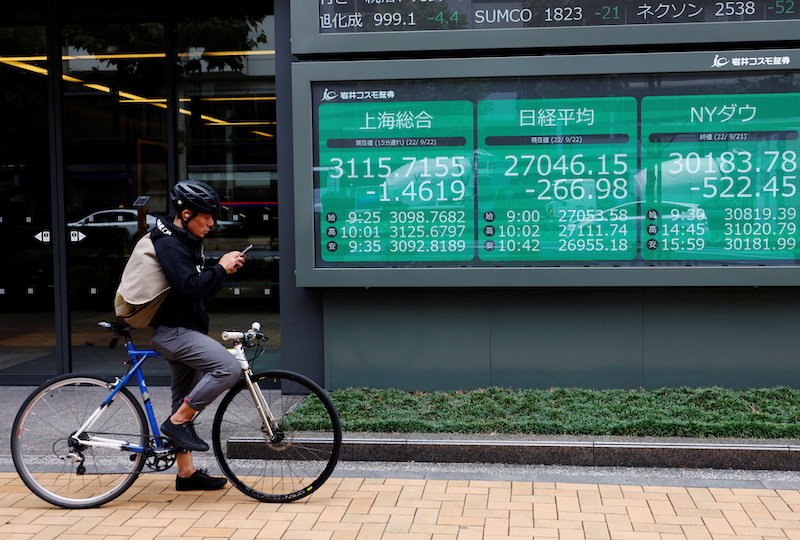Asian stocks were under pressure again on Wednesday as more disappointing economic data out of China further eroded already fading hopes of a recovery for the world’s No2 economy.
The shockwave from the winding-up order for property giant China Evergrande was also still being felt, pushing China’s and Hong Kong’s markets towards a sixth straight losing month.
But Japan’s market continued to be the outlier, notching its best January in 26 years after shaking off early chip-led declines.
Also on AF: Scandal-Hit Toyota Still World’s Top-Selling Automaker
The Nikkei recovered from losses as steep as 1% in early trading to end the day up 0.61% at 36,286.71, extending its gains for the month to 7.77%, its best start to the year since an almost 9% jump in January 1998. The broader Topix was ahead 0.96%, or 24.17 points, to 2,551.10.
It is the best-performing major stock index globally, eclipsing 3.3% gains each for the US S&P 500 and Nasdaq Composite.
The Nikkei currently sits about 1.9% below a 34-year peak at 36,984.51 from January 16, driven by a combination of foreign investor flows out of China, a profit-boosting weak yen and excitement over corporate governance reforms, besides sheer momentum.
China and Hong Kong stocks extended declines on the last trading day of January, as economic data and stimulus measures disappointed.
China’s manufacturing activity contracted for a fourth straight month in January, an official factory survey showed on Wednesday.
And more Chinese cities, including Suzhou and Shanghai, relaxed home purchase restrictions this week in a bid to revive demand, but property stocks remained weak with investors seeing the policies as piecemeal.
Hang Seng’s Eight-Year Low
The blue-chip CSI 300 Index slipped 0.91% and the Shanghai Composite Index lost 1.48%, or 41.98 points, to end at 2,788.55. The Shenzhen Composite Index on China’s second exchange dived 3.03%, or 48.22 points, to 1,544.90.
Hong Kong’s Hang Seng was on track for its worst January performance since 2016, with tech and property stocks leading the decline.
The Hang Seng Index dropped 1.39%, or 218.38 points, to 15,485.07. The Hang Seng Tech Index and Hong Kong-listed mainland property stocks have tumbled 19% each so far in January.
Elsewhere across the region, in earlier trade, Seoul, Wellington, Bangkok and Taipei also fell, though Sydney, Singapore, Manila, Mumbai and Jakarta rose.
MSCI’s broadest index of Asia-Pacific shares outside Japan slid 0.4% and was heading for a monthly loss of roughly 5%, snapping a two-month winning streak.
Nasdaq futures fell 0.8%, while S&P 500 futures lost 0.4% ahead of big tech earnings. Eurostoxx 50 futures were flat.
Other market moves were largely subdued as traders stayed on guard ahead of the Fed’s rate decision later in the day, with expectations that the central bank will keep rates on hold.
Fed Rate Hints Focus
The focus, however, will be on Fed Chair Jerome Powell’s post-meeting press conference, as well as any hints from policymakers on how soon the Fed could begin easing rates.
Data on Tuesday showed US job openings unexpectedly increased in December and data for the prior month was revised higher, pointing to a still-resilient labour market that is likely to give the Fed room to keep rates higher for longer.
That propped up the two-year Treasury yield, which typically reflects near-term interest rate expectations. It was last at 4.3345%, having risen more than eight basis points for the month.
The US dollar similarly held broadly steady, with the euro down 0.24% at $1.08185. Sterling fell 0.19% to $1.2677.
In Australia, the Aussie fell 0.61% to $0.65625, after data showed consumer price inflation slowed more than expected to a two-year low in the fourth quarter, prompting markets to bring forward bets of rate cuts.
Among commodities, oil prices dipped after climbing in the previous session as tensions linger in the Middle East. Brent futures slipped 22 cents to $82.65 a barrel. US crude lost 18 cents to $77.64 per barrel.
Key figures
Tokyo – Nikkei 225 > UP 0.61% at 36,286.71 (close)
Hong Kong – Hang Seng Index < DOWN 1.39% at 15,485.07 (close)
Shanghai – Composite < DOWN 1.48% at 2,788.55 (close)
London – FTSE 100 < DOWN 0.08% at 7,659.98 (0935 GMT)
New York – Dow > UP 0.35% at 38,467.31 (Tuesday close)
- Reuters with additional editing by Sean O’Meara
Read more:
China’s Manufacturing Declines in January, Amid Weak Demand
China Moves to Lift Property Sector Amid Evergrande Crash Fears
Will Evergrande Really be Liquidated? Not if China Says No
Evergrande’s Fall Weighs on Hang Seng, Tech Boost Lifts Nikkei
























